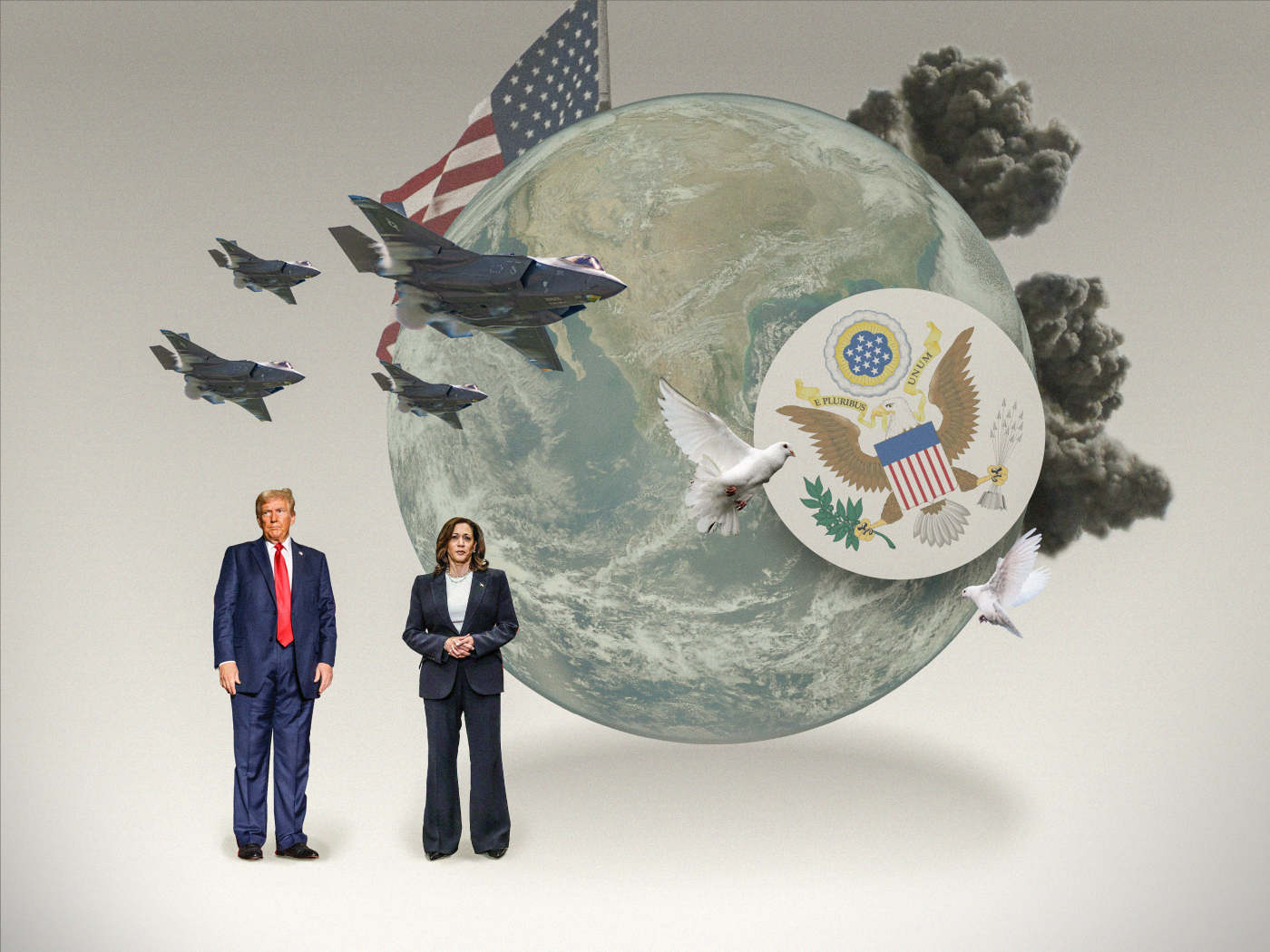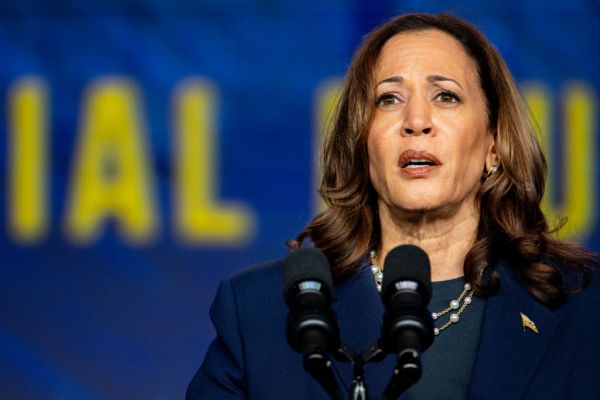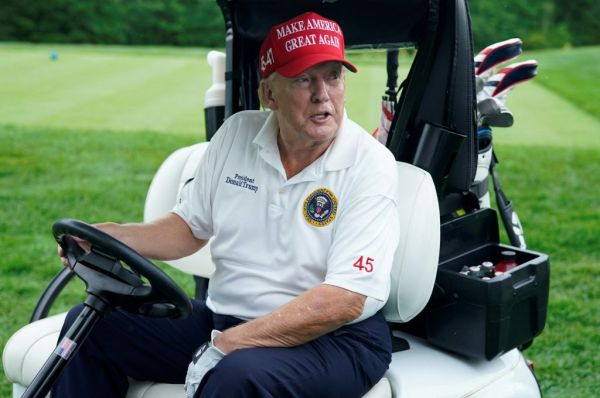Editor’s Note: Although partisans on both sides of the aisle have warned that the stakes of the upcoming presidential election could not be higher, the two campaigns themselves have been remarkably light on policy substance. With Election Day now less than a month away, we reached out to dozens of thinkers, writers, and analysts we trust with a simple question: What are your biggest policy concerns about a potential Trump or Harris administration? We will be publishing their responses—broken up thematically—in the coming days and weeks.
Today’s entry features experts in the national security and foreign policy realm. The world is in a precarious position, with major wars in Ukraine and in the Middle East. The United States’ adversaries—Russia, Iran, China, and North Korea—are growing closer to one another. That instability will present a daunting challenge to whichever candidate wins the election in November. Is either Kamala Harris or Donald Trump up to the challenge? Our foreign policy and national security experts highlight how, for disparate reasons, neither candidate inspires much confidence.
A bleak outlook for Ukraine.
Regrettably, I don't see many positive outcomes for Ukraine after November, whether under a Trump or Harris administration. Former President Donald Trump has repeatedly claimed he could quickly end the conflict but has yet to offer even a basic outline of how he would achieve this. The worst-case scenario for Ukraine under a Trump administration would be a cessation of U.S. military and economic support, forcing the Ukrainians to unwillingly cede territory to Russia in exchange for a dubious ceasefire agreement. Given Russia’s track record of dishonoring such agreements, it is highly likely that after a period of relative calm, the Kremlin would resume its aggression, leaving Ukraine in an even more precarious position.
A Harris administration, meanwhile, would likely continue the same indecisive “muddle along” approach pursued by the Biden White House. While President Joe Biden deserves credit for arming Ukraine early, his major decisions on critical weapons systems since then—such as Patriot missiles, HIMARS, Abrams tanks, and F-16s— have all come months too late to make the necessary impact on the battlefield. My concern is that a Harris administration would continue this policy of arming Ukraine to survive, but not to win—prolonging not only the war but also the suffering.
Neither Trump nor Harris seems to fully grasp the historical significance of this moment. The 2024 Republican platform does not mention Ukraine once. Running a total of 42,000 words, the Democratic Platform is only slightly better with an uninspiring section promising continued support for Ukraine running 96 words long.* This is hardly the inspiring stuff that will shape world events.
The outcome of the war in Ukraine will define the security of Europe—which one should remember is America’s largest export market and source of foreign direct investment—for a generation. If either candidate understands this, they have not shown it on the campaign trail. Trump knows supporting Ukraine is unpopular with his base, and Harris has shown no inclination to deviate from Biden’s minimalistic approach. Unfortunately, looking at it objectively, the next four years look bleak for Ukraine.
—Luke Coffey, senior fellow at Hudson Institute with a focus on Europe, Eurasia, NATO, and transatlantic relations
Trump’s undercutting of allies can embolden adversaries.
Former President Donald Trump’s repeated praise for North Korea’s Kim Jong Un, China’s Xi Jinping, and Russia’s Vladimir Putin is a national embarrassment. But his undercutting of American security commitments to allies in these men’s sights is downright dangerous: It tempts aggression and endangers peace.
Trump asks, “Why would we defend” South Korea as “they’re a very wealthy country.” Trump questions the implicit U.S. promise to defend Taiwan, stating, “Taiwan should pay us for defense” as “we’re no different than an insurance company,” while asking, “How stupid are we? They took all of our chip business.” He questions America’s formal obligation to defend Japan, stating, “We’ll have to change” that defense agreement because it’s “unfair.” Trump won’t protect NATO allies not spending enough on defense; rather, he’ll “encourage” Russia “to do whatever the hell they want” to them.
There are ways to restrain a president who steps in the wrong direction as commander in chief. Congress can withdraw funds from ill-conceived operations; the military must disobey illegal orders. But no one can force a president to go to war. Courts won’t entertain so-called “political questions”: They won’t order a president to defend an ally, as courts cannot enforce such an injunction. Congress might impeach and remove a president if it considered failure to fulfill a treaty obligation to be a “high crime” within the meaning of the Constitution. After the Senate failed to convict Trump for his role in the January 6 assault on the Capitol, though, impeachment appears to be a dead letter.
A North Korean invasion of South Korea, a Chinese invasion of Taiwan, an adversary’s attack on Japan, or a Russian invasion of a NATO ally that failed to draw a U.S. military response would mark the end of America as a superpower. Washington’s security guarantees mostly kept the peace since 1945; indeed it’s when the U.S. is not clear about her willingness to defend an ally that trouble follows, as in Korea in 1950 and Kuwait in 1990. Yet Trump actively casts doubt on his intent to honor American promises, which could easily embolden Kim, Xi, and/or Putin, causing devastating conflicts even if the U.S. sought to remain on the sidelines as at the outset of past world wars.
—Kevin Carroll, former senior counsel to Homeland Security Secretary John Kelly
Complacency or dysfunction: The two candidates present different risks.
There are reasonable concerns to be had about the foreign policies of both prospective Harris and Trump administrations. Yet, that does not make them equivalent nor does it obviate the dramatic downside risks that Trump’s testing of our constitutional order represents.
In Vice President Harris’ case, the widely shared expectation of policy continuity with the Biden administration is itself worrying. In my judgment the current confluence of crises in different regions of the world is a result of U.S. policy choices over successive administrations—including prominently by the present one.
The gradual hollowing out of our defense budget, the failure to enforce President Barack Obama’s red line in Syria, the tepid response to the 2014 annexation of Crimea by Russia, the withdrawal from Afghanistan, and the commendable but too sluggish assistance to Ukraine since 2022 have all chipped away at our ability to deter our adversaries and have emboldened China, Russia, Iran, and others to test the limits of our willingness to stand by our commitments.
Nothing that Harris has said or done inspires confidence that her presidency would break with the complacency that has placed the United States and its allies on a path of managed decline and rising geopolitical instability. Perhaps such a shift will be dictated by events. Yet, the intellectual capital needed to respond to those events effectively might not be there.
The prospect of a Trump presidency is no less reassuring—quite the contrary. Trump’s mercurial nature and his zeal to fight the “deep state” to protect himself from criminal prosecutions are bound to bring dysfunction to Washington, dramatically increasing uncertainty.
If “personnel is policy,” then Americans, our allies, and our adversaries are all in the dark about America’s future behavior on the global stage: The range of personalities occupying positions of influence within the next administration will likely vary from the likes of Robert O’Brien to J.D. Vance. It is anybody’s guess to whom Trump will listen on any given day. In the past, we have watched him go from issuing nuclear threats against dictators to fawning over their love letters. In addition, a possible constitutional crisis and a soft spot for some of the worst autocrats on the global stage make Trump’s return to the White House a singularly perilous path toward restoring America’s leadership in the world.
—Dalibor Rohac, senior fellow at the American Enterprise Institute studying European political and economic trends
America’s turn toward isolationism is undeniable—and bipartisan.
It’s tempting to make sweeping, existential statements about the perils to American democracy posed by both candidates: Trump will end our republic as we know it; Kamala will use a Democratic majority to bring new states into the union, expand the Supreme Court, and install an effective permanent Democratic dictatorship. Both seem apocalyptic and unlikely to be true, at least not for as long as the GOP controls the Senate. Rather, the future we should fear is a continuation and expansion of the present, a growing economic, political, and strategic isolationism supported by both parties. The Democrats’ performative internationalism—NATO! The G7!—is hollow, under-resourced, and unserious. Although the poohbahs of the GOP would be loath to admit it, their attention to the brie and chardonnay international circuit is actually similarly motivated.
Both sides see international alliances not as intrinsic goods, but as a means for the United States to do less. Harris would like to go to the parties and pretend everyone is doing something so Washington can turn to other pressing matters; Trump would like to shun the internationalist confabs and assert, more correctly than not, that everyone is doing too little, so why should Washington do more. Either way, both parties have an unspoken consensus around the idea that America should do less, others should do more, that free trade is a relic of the past, and that while we should all focus on China, we should not spend what is necessary on defense to make that focus meaningful.
The truth of bipartisan America’s inward turn is undeniable. And unfortunately, the world’s rogues have cottoned on. The stars of 1930s-style ideological and territorial revanchism in the 21st century may be Russia, China, and Iran, but there are plenty of others eager to play their part in overturning the global order that has served to make America and Americans the world’s richest and most powerful. The vagaries of Chaplinesque dictators like Kim Jong Un are all good and fun until they use or share their nuclear weapons. So while J.D. Vance rails against the evil warmongers and Kamala seeks to replicate the drivers of the Great Depression, our enemies advance. Four years is a long time for them to have a free hand.
—Danielle Pletka, distinguished senior fellow in foreign and defense policy studies at the American Enterprise Institute
Bipartisan risk aversion on Iran only makes conflict more likely.
My primary concern is the absence of any serious bipartisan discussion or strategy to counter Iran. After the collapse of the JCPOA revival negotiations in 2022, there has been a policy drift on Iran—both on nuclear and non-nuclear matters. The Biden administration and Congress had an opportunity over the last three years to establish a bipartisan structure—akin to the committees empaneled for China policy—to develop a consensus on the acceptable contours of an Iran strategy. Despite the significant threats the Islamic Republic poses to the interests of the United States and its allies, this unfortunately has not been a priority.
To date, in the presidential campaign, there has been no public discussion from any candidate as to how they plan to handle the expiration of the snapback sanctions mechanism in October 2025 under U.N. Security Council Resolution 2231. If allowed to lapse, this would conclude consideration of the Iranian nuclear issue at the U.N. Security Council and terminate all previous restrictions on Tehran. It's still on the books, despite the death of the 2015 agreement, and the clock is ticking. That is just months after the new president will take office in January 2025.
There needs to be a bipartisan recognition that U.S. deterrence against Iran has been dangerously eroded. U.S. responses to Iranian aggression have been inconsistent across administrations and have not kinetically targeted the source of the threats: the Islamic Revolutionary Guard Corps and its assets in Iran. The supreme leader exploits this U.S. risk aversion and self-deterrence. U.S. restraint, in contrast, makes war more likely, especially when Iran is challenging the U.S. on its own soil via assassination plots and America is not responding on Iranian soil.
There also needs to be greater recognition that nuclear diplomacy with the Islamic Republic is likely to never be durable because the current leadership in Iran will view it as the ceiling and not the floor of engagement with the West, but Western policymakers will view it as the floor and not the ceiling of their concerns with Tehran. This necessitates a long-term policy based on deterrence—economic pressure, diplomatic isolation, and the development of a credible military threat. Iran can be deterred, even without a nuclear agreement.
—Jason M. Brodsky, policy director of United Against Nuclear Iran
Trump is a threat to the constitutional order.
My top concern about the Harris administration is that, because of her lack of expertise on defense issues, she won't commit the resources needed to quickly build up our forces to deter the converging axis of China, Russia, Iran, and North Korea.
I am, however, much more concerned about a Trump administration. Donald Trump and his supporters are a danger to constitutional governance in America.
One specific scenario I worry about is President Trump, enabled by an enfeebled Congress and more ruthlessly competent advisers, to issue legal orders for the military to engage in violent suppression of domestic protest or to execute arrest warrants for the president’s political opponents. The president has unchecked constitutional authority to declare an insurrection is occurring and deploy our military forces to use violence against their fellow Americans. Trump wanted to do it in 2020, and he’s threatening it now.
It’s a myth that the U.S. military can refuse to carry out immoral orders; they do not get to make that judgment, they can only resign. And Trump has been working to discredit the military’s leadership, most of whom would resign rather than carry out such an order … but at some point he’d find willing accomplices, and it would destroy the relationship between our military and the American public.
—Kori Schake, senior fellow and director of foreign and defense policy studies at the American Enterprise Institute
Correction, October 9, 2024: Luke Coffey’s contribution to this symposium originally referenced the Democrats’ 2020 platform on Ukraine rather than the party’s 2024 platform.






Please note that we at The Dispatch hold ourselves, our work, and our commenters to a higher standard than other places on the internet. We welcome comments that foster genuine debate or discussion—including comments critical of us or our work—but responses that include ad hominem attacks on fellow Dispatch members or are intended to stoke fear and anger may be moderated.
With your membership, you only have the ability to comment on The Morning Dispatch articles. Consider upgrading to join the conversation everywhere.